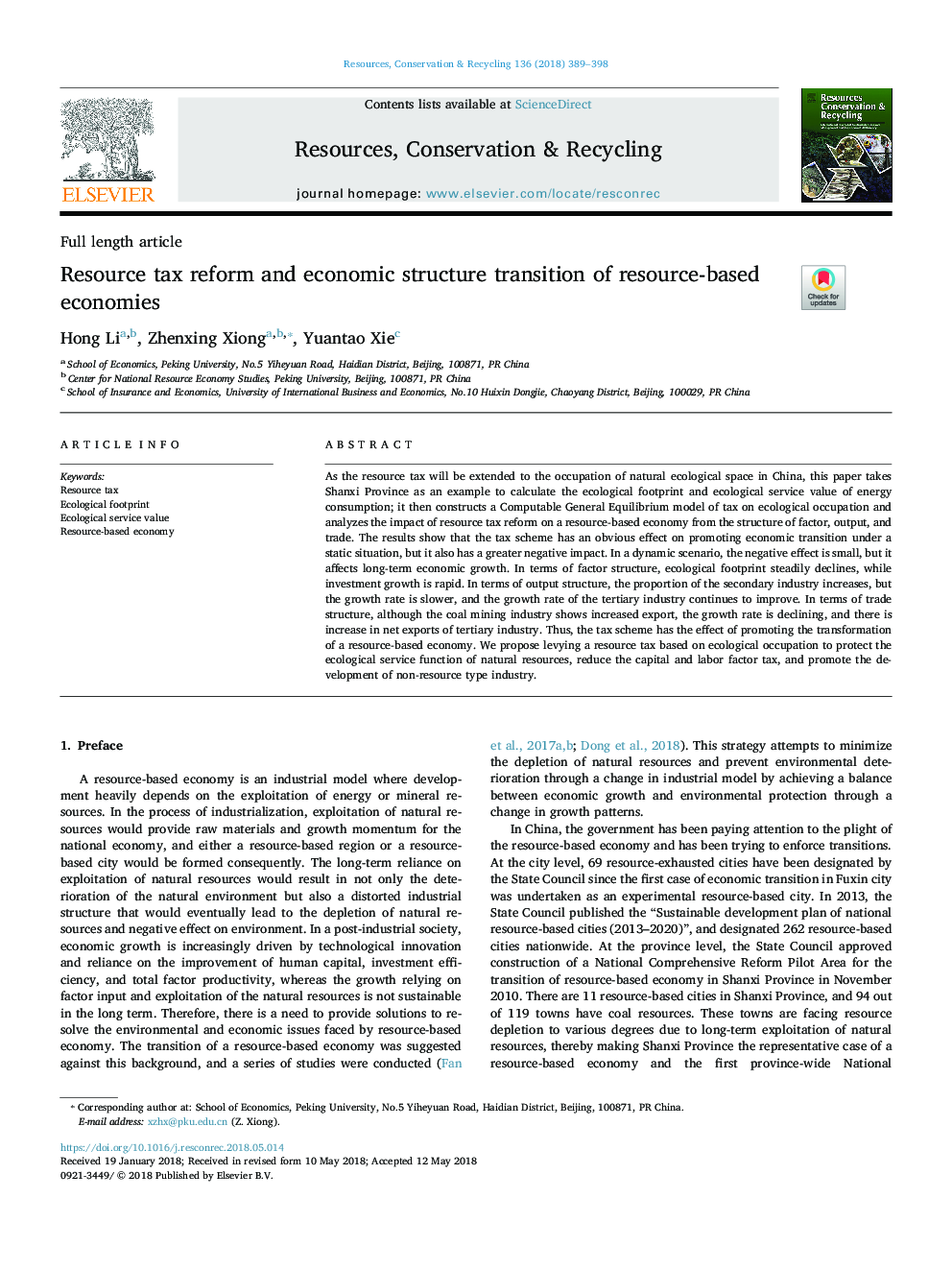| کد مقاله | کد نشریه | سال انتشار | مقاله انگلیسی | نسخه تمام متن |
|---|---|---|---|---|
| 7494109 | 1485656 | 2018 | 10 صفحه PDF | دانلود رایگان |
عنوان انگلیسی مقاله ISI
Resource tax reform and economic structure transition of resource-based economies
ترجمه فارسی عنوان
اصلاح مالیات منابع و ساختار اقتصادی انتقال اقتصاد مبتنی بر منابع
دانلود مقاله + سفارش ترجمه
دانلود مقاله ISI انگلیسی
رایگان برای ایرانیان
کلمات کلیدی
مالیات منابع اثرات زیست محیطی، ارزش خدمات زیست محیطی، اقتصاد مبتنی بر منابع،
ترجمه چکیده
با توجه به اینکه مالیات بر منابع به اشغال فضای بیولوژیکی طبیعی در چین گسترش می یابد، این مقاله استان شانشی را به عنوان مثال برای محاسبه ارزش های زیست محیطی و ارزش خدمات زیست محیطی مصرف انرژی می گیرد؛ سپس یک مدل تعادل عمومی محاسبه مالیات بر اشغال اکولوژیکی را ایجاد می کند و تاثیر اصلاحات مالیاتی منابع بر اقتصاد مبتنی بر منابع را از ساختار عامل، خروجی و تجارت تحلیل می کند. نتایج نشان می دهد که طرح مالیات تأثیر آشکاری بر ترویج انتقال اقتصادی تحت شرایط استاتیک دارد، اما تاثیر منفی نیز دارد. در یک سناریوی پویا اثر منفی کوچک است اما بر رشد اقتصادی بلند مدت تأثیر می گذارد. با توجه به ساختار عامل، اثرات زیست محیطی به طور پیوسته کاهش می یابد، در حالی که رشد سرمایه گذاری سریع است. از لحاظ ساختار خروجی، نسبت صنعت ثانویه افزایش می یابد، اما نرخ رشد کندتر است و نرخ رشد صنعت ثانویه همچنان بهبود می یابد. از لحاظ ساختار تجاری، هر چند که صنعت معدنکاری معادن صادرات را افزایش می دهد، نرخ رشد کاهش می یابد و صادرات خالص صنعت ثانویه افزایش می یابد. بدین ترتیب، طرح مالیات تأثیری بر ترویج تحول یک اقتصاد مبتنی بر منابع دارد. ما پیشنهاد می کنیم مالیات منابع را براساس شغل اکولوژیکی برای حفاظت از عملکرد خدمات زیست محیطی منابع طبیعی، کاهش مالیات بر سرمایه و نیروی کار، و ترویج توسعه صنایع غیر منابع به کار ببریم.
موضوعات مرتبط
مهندسی و علوم پایه
مهندسی انرژی
انرژی های تجدید پذیر، توسعه پایدار و محیط زیست
چکیده انگلیسی
As the resource tax will be extended to the occupation of natural ecological space in China, this paper takes Shanxi Province as an example to calculate the ecological footprint and ecological service value of energy consumption; it then constructs a Computable General Equilibrium model of tax on ecological occupation and analyzes the impact of resource tax reform on a resource-based economy from the structure of factor, output, and trade. The results show that the tax scheme has an obvious effect on promoting economic transition under a static situation, but it also has a greater negative impact. In a dynamic scenario, the negative effect is small, but it affects long-term economic growth. In terms of factor structure, ecological footprint steadily declines, while investment growth is rapid. In terms of output structure, the proportion of the secondary industry increases, but the growth rate is slower, and the growth rate of the tertiary industry continues to improve. In terms of trade structure, although the coal mining industry shows increased export, the growth rate is declining, and there is increase in net exports of tertiary industry. Thus, the tax scheme has the effect of promoting the transformation of a resource-based economy. We propose levying a resource tax based on ecological occupation to protect the ecological service function of natural resources, reduce the capital and labor factor tax, and promote the development of non-resource type industry.
ناشر
Database: Elsevier - ScienceDirect (ساینس دایرکت)
Journal: Resources, Conservation and Recycling - Volume 136, September 2018, Pages 389-398
Journal: Resources, Conservation and Recycling - Volume 136, September 2018, Pages 389-398
نویسندگان
Hong Li, Zhenxing Xiong, Yuantao Xie,
